|
We are pleased to present our annual flashglass anthology! Comprised of all flash works originally published online at rowanglassworks.org in 2017, this anthology is available for online viewing and for purchase in print. Copies will also be available for $5 cash at the AWP Conference and Bookfair in Tampa this March and at our upcoming readings at Rowan University.
Thanks to all our contributors for allowing us to present their work this year! 
By Glassworks Magazine in flashglass 24 pages, published 1/1/2018
an anthology of work originally published at rowanglassworks.org
0 Comments
The girl in the feather skirt gets tired of waiting for her story to start. When would the mushroomy underside of the moon explode? Darling, she writes, I’ve sold your clothes. She loves the slash and glister of her pen. By the time you read this, my ship will be en route. Here on board, gold-tasseled tablecloths sway. Petal by petal, an inchworm crosses the centerpiece of lilies and phlox. The galley door swings, dishes clink, a kettle hisses. Sometimes she strokes the cricket in her pocket for luck. Here on board, staircases unfold into silken dark and tenderness begins at its regularly scheduled time, nothing like a coin purse snapped closed. Snowflakes fall like whispers and someone keeps shaking the globe.
 The girl in the feather skirt opens door number two. Behind door number one are rain and hail, tornadoes, a roiling mess. Door number three conceals a hearse. She doesn’t mind silence, so she drives around her island. She just got her learner’s permit. It’s slow going, but she likes the wind on her skin, how the hearse gleams like polished leather, even the steep hills with no barriers between herself and the sea. Alone on the road, the girl tightens her seatbelt as kitchen windows blink past: a woman peels carrots: a man sharpens knives. A dog howls behind a picket fence. The girl in the feather skirt never thinks about the other doors. She hums. A door is not the story of a bright blue sky. She memorizes fractions and their decimal equivalents. She pets her skirt which she wears like an invisible shield. Like an opal, its color changes by increments, depending on the light.
Come prepared to convert the locals with your duffel bag of lipstick, ramen, t-shirts and the Good News in translation. Laugh at each challenging cross-cultural situation and tell everyone how much you love kasha. Say God loves you to the babushka who scolds you for sitting on cement, then cry as she helps you out of an open sewer grate. Embrace the homeless children who call you mildly obscene vegetable names while you feed them soup. After the near break-in, start sleeping with a bat beneath your bed. Stop sleeping. Keep your coat on at all times. Let no one in your room while you reread the book of Job. Struggle with your lust for an aging ex-con you meet at the mini-bus stop. Fall in love so hard you fall off the daybed, so drunk that soon the bedroom stops turning back into the living room. Drink Baltika No. 9 for breakfast with the shades down. Treat your sinus infection with fate. In the outdoor market, procure a wandering eye and a missing finger, a scar of unknown origin, and a knuckle prison tattoo. Eat nothing but cooked macaroni until your skin turns translucent. Teeter on spiked heels; fend off pickpockets with witchcraft. Step over the bodies by the tracks. Get on any train you want without a ticket.
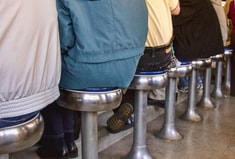 The diner cringes in snowfall. Parked pickups sneer as I slog to the door and peer in. The men at the counter hulk like Easter Island’s giant heads. They don’t bother to turn to watch me dripping in the doorway. Despite their hairy exteriors and filthy mouths, these men are devout churchgoers, whose Sundays yawp with hymns shaped like dirigibles and just as lofty. I want to explain to them that I once believed in both physical labor and spiritual bliss, but something underground derailed, and the blue sparks of dragging steel illuminated places I hadn’t imagined. Now I want to delve into distances brisker than the wind on the river, want to track through matter tougher and more permanent than snow. They’d laugh, of course, and look at me with dutiful Christian pity. Poor old coot, they’d mutter. Too much education for his own good. Too much mind to lose. Too many horizons bleak above his carcass as he naps. They’re right, of course, their faces brimming with health and ignorance. Better not to know how deeply the starlight despises us every night, how indifferent the winter daylight blue. And now, enveloped in snowfall, this diner sweats and smelts and crushes us all together in a scent of flesh so powerful even extinct carnivores threaten, their saber teeth glinting in the stainless landscape outside. William Doreski lives in Peterborough, New Hampshire, in a small house in the woods. He taught at Keene State College for many years, but has now retired to feed the deer and wild turkeys. He has published three critical studies, including Robert Lowell’s Shifting Colors. His essays, poetry, fiction, and reviews have appeared in many journals and several small-press books. His forthcoming book of poetry is The Last Concert (Salmon Press).
The crumbling steps now lead to no one’s front door, just a miniature precipice, a leap into the slumping depression left behind when everyone had had enough of whatever it was that ground them down. Resting in the soil: shattered glass; a bent fork; the scattered shards of a dinner plate; a metal box of rain-soaked recipes. Above, the planted trees huddle, swaying like a family around a hospital bed, waiting for the doctor’s bad news, already starting to mourn, thinking of who might take the piano and whether the cousin who drinks might want to be the last occupant, or could it be rented out to a hired hand, or could the siding be salvaged for a nephew’s barn, or whether to let nature take its course.
Mark Trechock lives and writes in Dickinson, North Dakota surrounded by wheat and grass and quite a few abandoned farmsteads. His poems have recently been published in Passager, Triggerfish, High Desert Journal, Jonah Magazine, Kestrel and Red Wheelbarrow.
She was infamous for having whiskey in her coffee cup while teaching. Mother would most days either fall asleep on the couch after her final two cherry Manhattans of the day, which I had learned how to make for her. Or she would beat me, with a hair brush, her stiletto heel, bookend, her fist, my belt—anything that was within reach when her violent nerve was triggered. I was often blamed, for answering the telephone (usually creditors), for talking back (children should be seen and not heard), for having chicken pox, for not cleaning the floor correctly, for anything and nothing at all. ~
~ My father died when I was 19; he was 45. My mother threw herself on top of his body and blamed herself for the cancerous end. Her drinking worsened. After college, I moved to New York. When I called her on a payphone to tell her that I was pursuing acting, she called me a slut and hung up. She threatened suicide 3 years later and I moved back to Pittsburgh. There were 10 years where I did not speak to her. The family home, she allowed to go to Sheriff’s sale, after abandoning it, not paying back taxes. The day after the birth of my daughter, 28 hours in labor, my Mother came to the hospital drunk. She told me that I had betrayed her. Four years later, I watched her have a heart attack in the E.R.. A tumor had dislocated her shoulder. She was put on morphine. She asked me if she was going to die. I said, yes.
 Comingled blood, dark as windfall cherries, spattered lichen-streaked stones: grandfather (dead of foolishness), still-born Baby Anne—your family plot. And you might have sprung, angle and bone, from that corner yew, dark, with dark lank hair while I was mere summer folk, city girl—pudgy, pale, whiskey-colored ringlets. But on that garland branch, we pricked thumbs, became sisters. Envy grew green as island pines. Your narrow saltbox: high-ceilinged rooms, chamber pots beneath iron beds, stone-floor kitchen with hand pump and black, wood-burning stove—matriarchal dragon dominating the room, captured me. Your grandmother, brown and bony as yourself, knew things. I trotted behind as she gentled Sunday’s chicken. Ax arced, shell-carved eye stilled while deranged feathers convulsed in mad, mute tarantella. I was baptized in blood. You hungered only for trolley rides, glass revolving-doors, luncheons on the mezzanine, until you turned fifteen—one umbrella step ahead as always—left for New Orleans, a married woman. Island wives lashed tongues, raised long, red welts on your memory: Got herself in trouble. Uh-huh. I alone knew it wasn’t love or even lust that lured you; it was city lights. Had I been offered spells and incantations, I’d have gone too.
|
FLASH GLASS: A MONTHLY PUBLICATION OF FLASH FICTION, PROSE POETRY, & MICRO ESSAYS
Categories
All
Cover Image: "Yellow Red Wine Glasses, Paris"
|
|
Glassworks is a publication of Rowan University's Master of Arts in Writing 260 Victoria Street • Glassboro, New Jersey 08028 [email protected] |
All Content on this Site (c) 2024 Glassworks
|

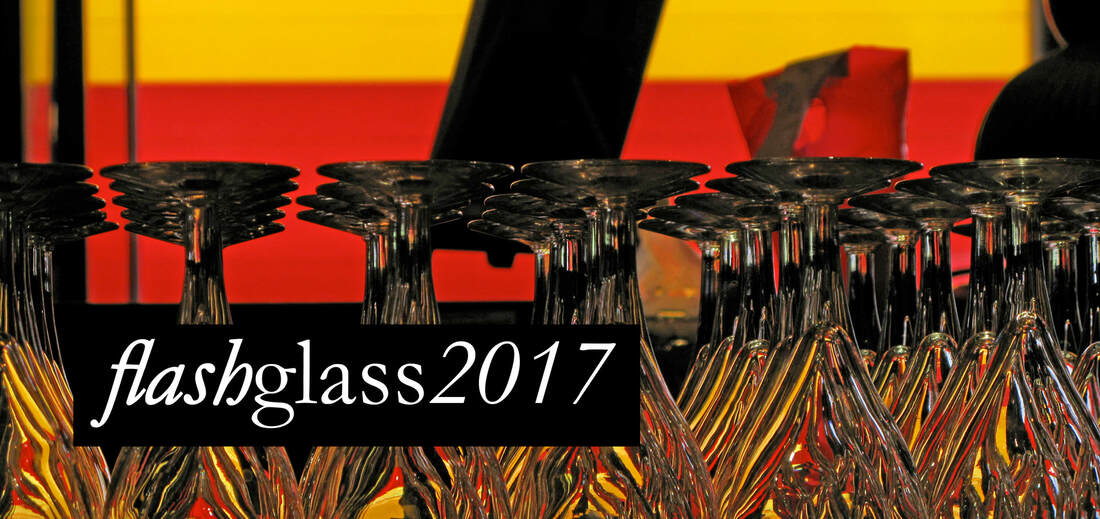




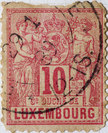



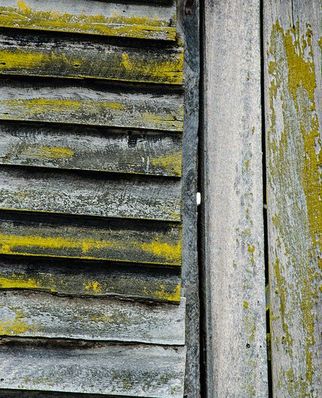
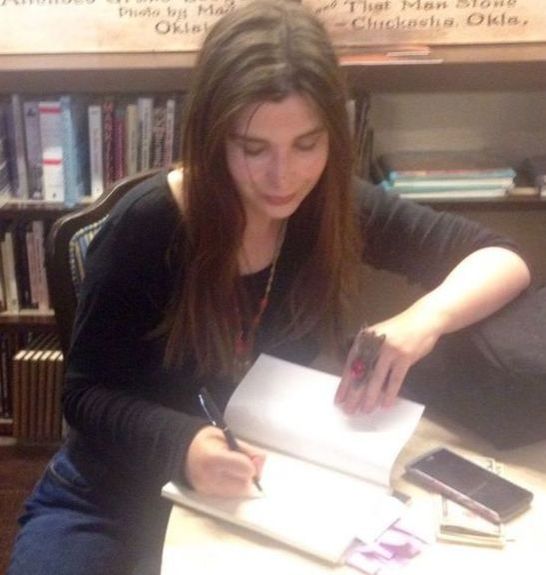




 RSS Feed
RSS Feed
